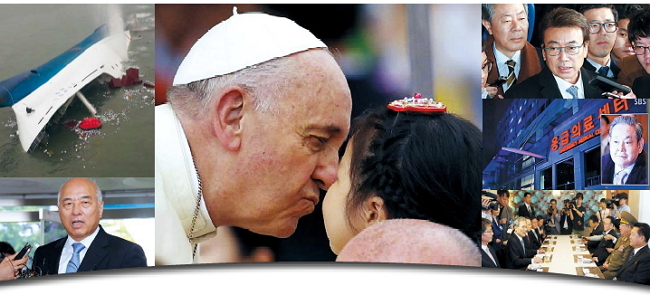
Each year tends to be a mixed bag of good and bad incidents, but the silver linings were hard to see this year.
Tragedy dawned on the morning of April 16 when the ill-fated Sewol ferry sent a distress call, with 476 people on board, many of whom were young students from a high school in Ansan.
Koreans were briefly relieved at one point in the day to hear the news that most of the passengers were rescued. But the report was false, horrifyingly removed from the tragic developments that eventually left more than 300 people dead or missing.
The deadly sinking of the 6,825-ton vessel triggered a huge wave of impact across the nation this year, shaping most political conflicts and dampening the already sluggish business atmosphere. A torrent of arrests, investigations and angry protests engulfed the nation. Koreans struggled with the traumatic image of young students patiently waiting to be rescued, while crew members and the captain escaped from the sinking ferry.
The accident also laid bare a number of problems plaguing the country, including lax safety regulations and cozy relations among regulators and businesspeople in the private sector.
President Park Geun-hye, whose whereabouts on April 16 was mired in rumors, suffered a series of other setbacks. Her nominees for the country’s key offices were forced to resign over qualification problems, sparking criticism about her secretive method of vetting candidates.
A major political scandal involving Chung Yoon-hoi, Park’s former aide, swept the political scene, after the leak of an official Cheong Wa Dae document that suggested he meddled in state affairs.
Other high-profile scandals, such as the so-called “nut rage” involving former Korean Air vice president Heather Cho, also ignited public outcry.
Meanwhile, the Korean economy suffered some major blows this year. Some were external ― the nagging slump in the global economy and a freefalling Japanese currency ― while others came from within, such as the tragic sinking of the Sewol ferry that left the economy paralyzed for months.
The government recently downgraded the economic growth rate for this year to 3.4 percent, down from the 3.7 percent it predicted in August. On top of this, experts forecast that Korea faces deflation as consumer prices remain stubbornly low while demand is weak, from both consumers and companies. Household loans remain high while national debt has reached almost 500 trillion won this year.
The slowing growth at Samsung, the nation’s largest conglomerate, also sent shockwaves throughout the nation, and the situation at other conglomerates is not much better as they grapple with the strong Korean won and saturated domestic market conditions.
The banking sector, saddled with a string of scandals, is still struggling to get back on its feet. Banks are racing to adopt mobile technologies while financial holding companies are seeking to streamline their operations.
There were some hopeful developments on the economic front, however. For instance, Korea signed free trade pacts with China, Canada, New Zealand, Australia and Vietnam, to further expand its economic territory. There were many big IPOs valued at more than 4 trillion won, and exports remained strong.
The local cultural scene also witnessed a series of positive signs. Pope Francis visited Korea from Aug. 14-18, offering a rare message of hope and peace for Koreans. It was the first papal visit in 25 years after Pope John Paul II in 1989. He beatified 124 Korean martyrs at Gwanghwamun Square in Seoul. The ceremony drew nearly 1 million believers and spectators.
The local period flick “Roaring Currents” broke the nation’s movie viewership record, drawing 17.6 million people to theaters. The movie surpassed the previous high of 13 million set by the 2009 Hollywood sci-fi film “Avatar.”
Cable networks produced a number of hit programs threatening the three major broadcast networks KBS, MBC and SBS. They include tvN series “Misaeng,” JTBC talk show “Non-summit,” and tvN reality shows “Youth over Flowers” and “Three Meals a Day.” They have captivated the audience with realistic stories or unconventional plots.
But even the cultural sector was not without some traumatic incidents. Iconic rock musician Shin Hae-chul, 46, died of a heart attack on Oct. 27, caused by post-surgery complications. His death sparked a campaign to legislate a “Shin Hae-chul” law to better protect patients from possible medical accidents.








